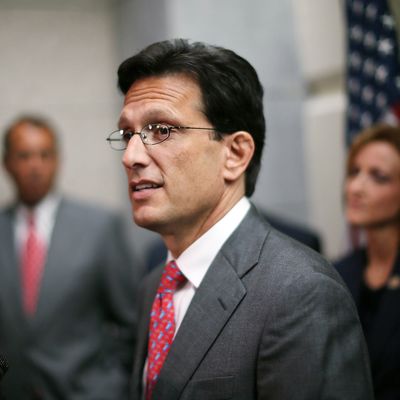
Republicans have insisted so often and so convincingly that they absolutely will not agree to higher taxes that all of us have assumed that a deal on the budget can’t happen, that sequestration is simply the new normal. The assumption has sunk in so deeply that nobody noticed when John Harwood got Eric Cantor to say, “If Mr. Obama shows he is ‘serious about fixing the problem,” he said, “‘then we’ll see’ about additional taxes.” [See update]
Eric Cantor! This is the man who is synonymous with opposing tax increases. When John Boehner tried to cut a grand bargain with President Obama in 2011, it was Cantor who slapped him down. Cantor voted against the fiscal cliff deal. If you gave Cantor the choice between a tiny increase in the top tax rate and selling the Pentagon to North Korea, he would think long and hard.
Naturally, Cantor quickly recanted. (“When pressed on the point,” Harwood reports, “Mr. Cantor returned to his familiar position that the House would not back higher taxes.”) Still, that he would even breach the maximal heresy seems noteworthy. There have been enough straws in the wind — unnamed House Republicans, via Ron Fournier, floated $250 to 300 billion in higher revenue — that it may be worth reassessing the House Republican position.
The Obama administration assumed that, after the election, House Republicans would have to deal. The expiration of the Bush tax cuts and sequestration, with its large and across-the-board cuts to defense, would put Republicans in a position where it would be ideologically advantageous to negotiate a deal. But they have steadfastly refused. Obama tried to get a big budget deal in November and December, wrapping up taxes and spending together. Republicans wouldn’t bite. Instead they fought to limit the tax hike to the smallest acceptable amount and didn’t negotiate for spending cuts. After that, they swore off negotiations — or, as they put it, “back-room deals,” as if there is some other way to negotiate.
The simplest way to explain the Republican position is that they care more about low taxes than the combined lure of obtaining cuts to retirement programs and averting cuts to defense. But another possibility is that the optics of negotiation repulsed the party. It felt like surrender.
The conventional wisdom of the Middle East is that the 1973 Yom Kippur war was necessary in order to allow the Camp David accords. Arabs felt humiliated in the wake of Israel’s 1967 triumph and needed their surprising victory — forcing Israel to be rearmed by the United States to stave off annihilation — to regain their dignity and let them negotiate.
Consider that dynamic when you read this quote from Tom Cole, in the same Harwood story: “Now that each side has recognized that the other cannot be bullied but must be bargained with, we have an opening to get things done.”
Of course, Obama wasn’t bullying Republicans. He was offering to meet them halfway. But they felt humiliated by his election win and the expiration of the Bush tax cuts.
Possibly Republicans just want to look reasonable and avoid owning up to their implacable anti-tax stance. But just maybe allowing sequestration to take place has in some bizarre way placated their need to save face and allowed them to negotiate without feeling humiliation. Who knows? Gaming out the Republican position is always an exercise in primal psychology.
Update: I inadvertently placed some of Harwood’s paraphrase in Cantor’s words. Here is what Harwood wrote, and for clarity, I’m removing the quotes around the entire phrase and only quoting Cantor’s words:
If “Mr. Obama shows he is ‘serious about fixing the problem,” he said, “then we’ll see” about additional taxes.
As an oversight, I left off the endquote after “see.” The remaining words, “about additional taxes,” were Harwood’s paraphrase.
Cantor spokesperson Douglas Heye e-mails, “At no time did Majority Leader Cantor say we was open to ‘additional taxes.’ In fact, he made the point repeatedly that the House will not raise taxes.”






























